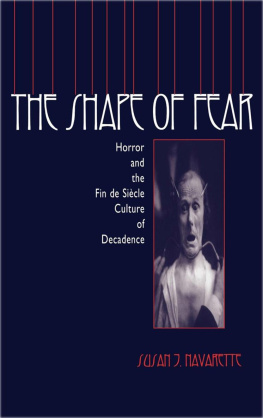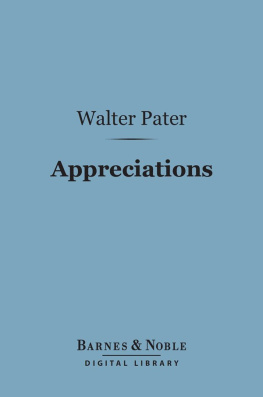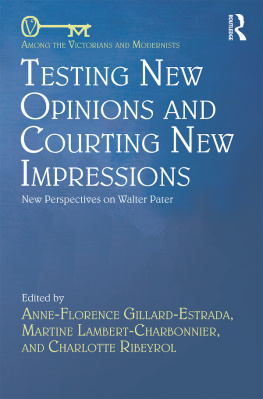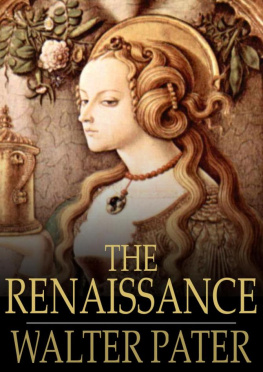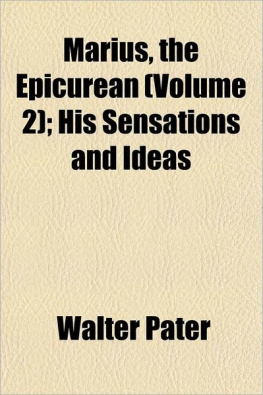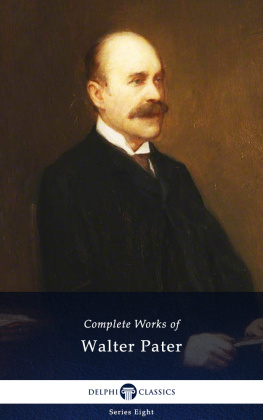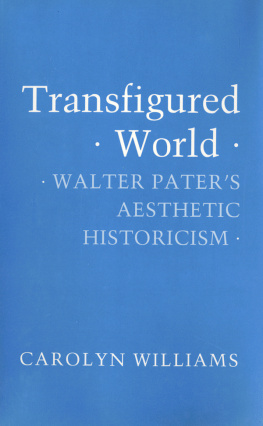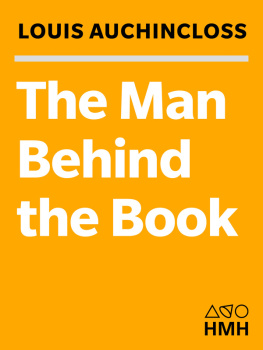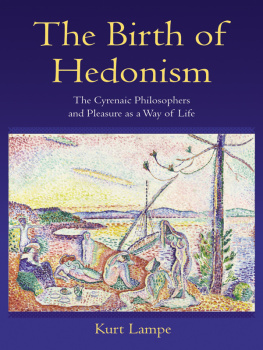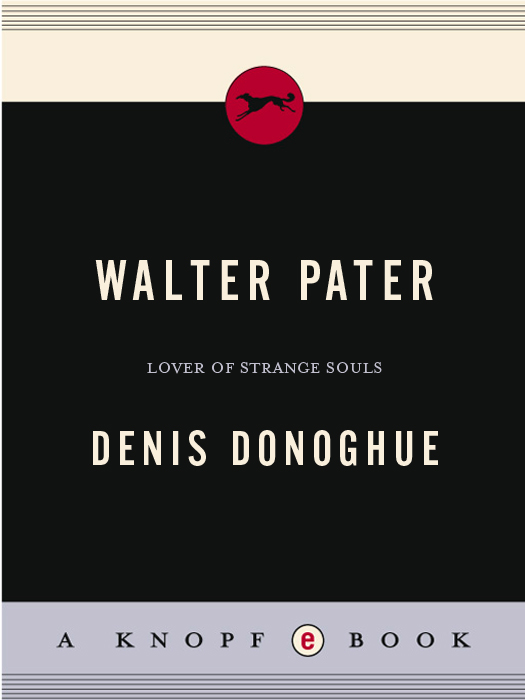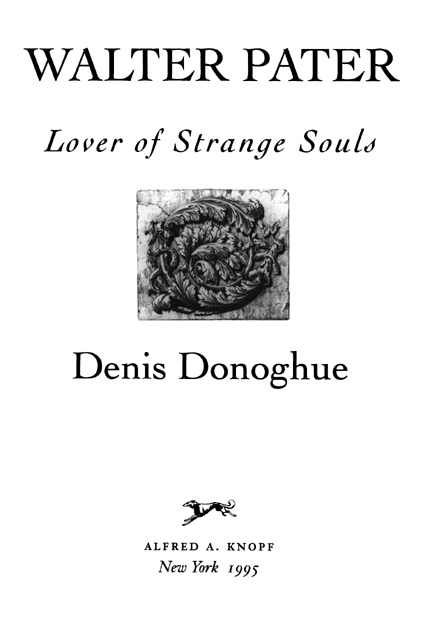THIS IS A BORZOI BOOK PUBLISHED BY ALFRED A. KNOPF, INC.
Copyright 1995 by Denis Donoghue
All rights reserved under International and Pan-American Copyright Conventions. Published in the United States by Alfred A. Knopf, Inc., New York, and simultaneously in Canada by Random House of Canada Limited, Toronto. Distributed by Random House, Inc., New York.
Owing to limitations of space, all permissions to quote from previously published material can be found immediately following the index.
Library of Congress Cataloging-in-Publication Data Donoghue, Denis.
Walter Pater: lover of strange souls / Denis Donoghue.1st ed.
p. cm.
eISBN: 978-0-307-83157-6
1. Pater, Walter, 18391894. 2. Authors, English19th centuryBiography. I. Title.
PR 5136. D 66 1995
824.8dc20
[B] 94-12843
v3.1
For Frances and the Children
Contents
Preliminaries
I
M Y EARLY READING did not include much of Walter Paters work. I recall from some anthology of English prose a passage about the Mona Lisa that I thought gorgeously purple, another about a hawthorn tree, and one about a man seeking something in the world that is there in no satisfying measure or not at all. At University College, Dublin, I read anything that came my way, subject to two considerations. I was much taken with the work of the American New Critics, especially those who seemed to have issued from T. S. Eliots overcoat: Cleanth Brooks, John Crowe Ransom, R. P. Blackmur, and Kenneth Burke. Closer to home, I kept up with the work of F. R. Leavis and the critics he published in Scrutiny. But I read those critics unequally. I took my general sense of modern literature mainly from Eliots The Sacred Wood and Leaviss New Bearings in English Poetry. According to that view, literature is the supreme means by which, as Leavis wrote in an early essay on D. H. Lawrence, we undergo a renewal of sensuous and emotional life, and learn a new awareness. Pater was not thought to be as dangerous, because he was not as sinister, as the BBC and the journalists of Fleet Street. If mentioned at all, he was taken to exemplify the genteel tradition in English life, a body of sentiment already discredited. Reviewing Santayanas The Last Puritan in Scrutiny under the title The Last Epicurean, Q. D. Leavis thought it sufficient to make the point by associating Santayana and Pater with gentility:
Professor Santayana is probably the last very distinguished mind to cherish that tradition, which is the reason that this review is headed The Last Epicurean. Not Epicurean with reference to the original Epicurus of course; the adjective is intended delicately to suggest a relationship with the Oxford branch of the family. Pater, though his literary art was at the opposite extreme from Professor Santayanas, was also a victim of the feminine charm of Oxford.
In the same review, Q. D. Leavis compared The Last Puritan, to its disadvantage, with The Education of Henry Adams and L. H. Myerss The Root and the Flower.
F. R. Leavis was a major critic, a great rhetorician on the social ramification of literature, comparable to Johnson, Coleridge, and Eliot, but he rarely wrote a sustained analysis of a poem, a play, or a novel. He quoted long passages and pointed to their demonstrable qualities, but his force in critical practice was a matter of intervening on literary issues, challenging received opinions on the value of one writer or another. I read the American critics mainly to see what close reading meant and to find the modern literature of England, Ireland, and America considered in relation to the European novel. Burke and Blackmur were masters of close reading, especially in early essays on Eliot, Pound, Yeats, Williams, and Marianne Moore. Philip Rahv and William Phillips edited Partisan Review and printed there some of the most formidable essays on social and literary issues. But I felt special admiration for Ransom. Like Wallace Stevens and Paul Valry, Ransom had nearly as much interest in aesthetics as in poetry. The essays he printed in The Kenyon Review attended mostly to the theory of poetry and assumed that a steady reading of Aristotle, Kant, and Hegel would help anyone in reading Shakespeare, Donne, and Milton. Paters name appeared occasionally, but Kenneth Burkes commentary on Gaston de Latour in his Counter-Statement is the only essay on Pater I recall reading in the context of the New Criticism. Burkes chapter is called Adepts of Pure Poetry, and his adepts are Flaubert, Pater, and Remy de Gourmont.
So I didnt come to Pater on the clear recommendation of the masters in criticism. The writers most frequently recommended were Leaviss major novelists, Jane Austen, George Eliot, Henry James, Conrad, and Lawrence. The poets to be reckoned with were Eliot, Pound, and (with reservation) Yeats. The writers most admired in The Kenyon Review and Partisan Review were James, Kafka, Joyce, Hopkins, Mann, Dostoevsky, and Tolstoi.
But there was another map of modern literature available to me. I read Yeatss autobiographical volumes and his Oxford Book of Modern Verse. It is customary to regard the Oxford Book as eccentric, Yeatss silly tribute to his friends. His introduction to the book is thought to be bizarre. And what did he think he was doing, choosing as the first poem in the anthology Paters sentence about the Mona Lisa and turning it into mediocre free verse? In The Phases of the Moon Yeatss Robartes says: He wrote of me in that extravagant style / He had learned from Pater. In his autobiographical books Yeats presents Pater as the sage of Oxford, a remote figure to be approached occasionally by Lionel Johnson and Arthur Symons and yet in his reserved way the man chiefly responsible for the poetry of the nineties and its consequence in modern literature. Yeats was suggestive rather than specific. He didnt make it clear to me how the poetry of Paters day had turned into the poems written by Yeats himself in his later years and by Eliot, I think, but cant prove, that Yeats associated homosexuality with feminine souls in men, the passive role in experience.
Yeats wasnt much help, either, when I started wondering how Pater chose the major interests of his work: Italian Renaissance painting and sculpture, Greek mythology and sculpture, nineteenth-century German criticism and aesthetics. Why those? They would not now be regarded as self-evidently the cultural artifacts most worth thinking about. A young critic today interested in art, literature, and aesthetics would probably choose to pay attention to nineteenth-century French art, the art of Africa or Mexico, and contemporary American painting and photography as the interests worth having. The reason for those choices may be politically opportunist: Greece and Rome are no longer the imperative virtualities they were to Paters generation. This, too, may pass. But one way of describing Paters work is that he set out to create a personal style by paying a special kind of attention to ancient Greece and Rome, Renaissance Italy, and modern German aesthetics. He sensed that these were the materials he could convert to his own spirit. Yeats was Paters disciple in this respect, except that he thought of style in public terms, embodied however inadequately in the Abbey Theatre, and he added the Japanese Noh plays and the lore of pagan Ireland to Greek tragedy and Italian Renaissance art, the culture of Urbino and Ravenna.


